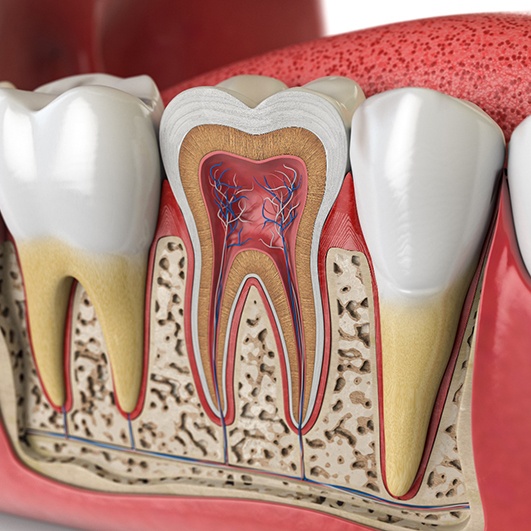
Root Canal Therapy – Eatontown, NJ
For Toothaches That Can’t Wait!
Sometimes, a person might experience a little dental pain due to minor temperature sensitivity, and this usually passes after a few moments. However, for a toothache that is severe, lingering, and only getting worse, that’s when someone might need to seek out root canal therapy. With this procedure, our team can stop the worst dental pain, save distressed teeth, and help people get back to their lives with one less thing to worry about. If you’re stuck at home with a throbbing tooth right now, give us a call today to start getting the relief you deserve with root canal therapy in Eatontown!
Why Choose NU Dental Eatontown for Root Canal Therapy?
- In-House Sedation Options For Anxious Patients
- Convenient Evening Dental Office Hours For Busy Families
- Get Seen For Care The Same Day You Call
Why Do I Need a Root Canal?

The center of the tooth is home to a dense collection of blood vessels, tissues, nerve endings, and other organic materials. This collection, known as the pulp, is protected by a thick layer of enamel. As a result, bacteria cannot reach it unless the enamel layer is compromised, either by decay or injury that cracks or erodes it. If the pulp becomes infected, you’ll quickly notice a high level of discomfort that is so unbearable you won’t be able to ignore it. Without professional care, your dental infection will not get better on its own. Additionally, it can spread to other teeth if not treated right away.
The Root Canal Process

This procedure is meant to relieve discomfort and preserve as much of your healthy natural tooth as possible. During your treatment, we’ll first ensure you feel comfortable and safe by using a local anesthetic to numb that area of your mouth. Our team can also offer various sedation options to help you stay relaxed if you’re feeling a bit anxious about your procedure. Once you’re settled and your dentist has assessed your oral health, we’ll begin the treatment.
We’ll make a tiny hole in your enamel, making sure to take out any damaged or infected tissue from within your tooth. Our team will then clean and sanitize the area to make it bacteria-free before we fill the tooth with a biocompatible substance. After we’ve filled it, we’ll typically cap it with a durable dental crown to provide its natural function and appearance.
The Benefits of Getting a Root Canal

Not only is root canal therapy completely safe, but it can also effectively prevent more serious oral health issues from happening later on. Here are several of the most crucial benefits you can expect to enjoy from this treatment:
- Pain-free treatment: Our team will be sure to provide you with the necessary anesthetics or even sedation therapy to make your experience as painless as possible. You’ll feel as though you simply got a filling, and you won’t need nearly as much recovery time as with a tooth extraction.
- Eliminate bacteria growth: This procedure cleans out the harmful particles that are causing severe discomfort, that way you can return to enjoying your healthy and beautiful smile!
- Preserve your natural tooth: Restoring your tooth saves you the money, time, and numerous problems that come with tooth loss.
Understanding the Cost of Root Canals

The cost of a root canal in Eatontown can vary for each patient. It depends on the complexity and severity of the case at hand. Our team will be sure to provide you with an honest price estimate before we start to work on your smile. Rest assured that even though this procedure can be costly, it is a wise investment in your oral health because the priority should always be to preserve your natural tooth when possible.
Factors That Can Affect Root Canal Cost

When you come in for your appointment with your emergency dentist in Eatontown, we will examine your mouth before providing a cost estimate for your root canal. Some factors that could influence its pricing are:
- The type or location of the tooth. Incisors generally range from $300-1,000. Premolars are usually in the range of $400-1,800 as compared to $500-2,000 for molars. Pricing is directly related to how involved the treatment is – molars have multiple roots while incisors only have one.
- The complexity of the case. Depending on the difficulty of the procedure, it might be necessary to involve a specialist. They may operate under a different price structure than we do.
- Additional services are involved. For example, a dental crown may be recommended to help protect and fully restore your tooth. A crown means an additional expense, and the cost will depend on the type of tooth.
Is It Cheaper to Pull My Tooth?

If money is tight, you might be tempted to go for a tooth extraction instead of root canal therapy. It is true that in the near term, removing a tooth is less expensive than preserving it. However, a root canal can certainly be more affordable in the long run. Not only can it spare you from having to pay for tooth replacement but keeping your natural teeth can also prevent future dental issues that would incur further expenses.
The longer you wait to get a root canal, the more likely it is your tooth will have to be removed. Then, concerns about your bite being impacted to cause discomfort and difficulty eating enter the picture.
Does Dental Insurance Cover Root Canal Therapy?

Most dental insurance plans do cover root canal therapy. It is usually classified as a major procedure, meaning that 50-80 percent of the cost may be covered up to the amount of your plan’s annual maximum. You will need to examine your policy’s details to know for sure how it applies.
Our practice welcomes insurance. We will be happy to verify your coverage, file your claims paperwork, and help you understand your benefits.
Other Options to Make Root Canal Therapy Affordable

Beyond helping with your insurance, we offer other avenues to make your root canal therapy feasible:
- Financing: We can help you break up the cost of your care into smaller, easier-to-manage monthly payments with CareCredit. This is a great way to help your dental care fit comfortably into your budget, and many of the plans they offer have little-to-no interest!
- Membership Plan: You simply pay an annual fee, and you’re instantly covered for your routine dental care for the entire year, plus you’ll get 15-25 percent off other services like root canals – depending on which level of plan you choose.
In your time of need, we are ready to help with your root canal therapy. We’ll help you navigate the financial aspect, so don’t hesitate to contact our team with any questions!
Root Canal FAQs

Are you ready to put a stop to your tooth pain? Our team is here to help! Before you begin the root canal process, please let us know if you have any questions or concerns about what to expect. We’ll do everything we can to make sure that you feel fully prepared for your treatment! To help you get started, we’ve answered some of the questions that we’ve heard most often from our patients; feel free to reach out if there’s something you want to know that isn’t discussed here.
How Long Does It Take to Recover from a Root Canal?
The answer varies from patient to patient. Many people are able to return to work or school the day after the procedure, but those with jobs that involve physical labor usually need to take at least two or three days off.
During the recovery period, you can manage your discomfort with over-the-counter pain medications. You’ll be able to brush and floss like you normally would, but you should be gentle around the tooth that was treated. If you notice any signs of infection, call our office immediately.
How Much Pain is Normal After a Root Canal?
The treatment itself won’t hurt since your mouth will be numbed. However, you may experience some discomfort and sensitivity for a few days. Ibuprofen and other over-the-counter pain relievers are usually enough to help you manage it. Trying to chew anything hard could make your discomfort worse, so plan on sticking to soft foods until you’ve sufficiently recovered.
The pain should start to fade after three days. If it persists or seems to grow worse over time, something is wrong, and you need to call our office right away.
Can I Eat Before a Root Canal?
If a sedative will be used during your root canal therapy, you’ll likely receive instructions to fast for a few hours before your procedure. This is because some forms of sedation could potentially cause nausea if you’ve eaten recently. On the other hand, if sedation won’t be used, it may be a good idea to have a healthy meal a couple of hours before your root canal; it will be hard to eat until the local anesthetic numbing your mouth wears off.
Regardless of whether you’re being sedated or not, you should avoid alcohol for at least 24 hours before your root canal, as it might make it harder to induce numbness.
Are Root Canals Safe?
Root canal therapy is considered to be an extremely safe treatment with a high rate of success. While there are claims that the procedure can increase the risk of certain medical conditions, the idea is based on faulty research from nearly a century ago and has been thoroughly debunked. That said, there is a small chance that reinfection could occur if all the bacteria in the teeth aren’t removed; that’s why you should call our practice right away if you notice unusual symptoms like swelling or fever.
Do I Need Antibiotics Before or After My Root Canal?
In most cases, you do not need to take antibiotics before or after a root canal. Antibiotics are typically only prescribed if you have certain health conditions, such as heart issues or a weakened immune system, which could increase your risk of developing an infection after the procedure.
Our team will carefully review your medical history prior to the root canal to determine if antibiotics are necessary in your specific situation. If no such conditions exist, you likely won't need them, as the procedure itself is designed to clean and seal the affected tooth, reducing the risk of infection.
Can Root Canals Be Prevented?
Yes, root canals can often be prevented by maintaining good oral health! Daily habits like brushing, flossing, and using mouthwash, along with regular dental checkups and cleanings, reduce the risk of bacteria reaching a tooth’s pulp. A healthy diet that limits sugar, includes nutritious foods, and plenty of water is also important for protecting your teeth.
Additionally, wearing a mouthguard during sports and a nightguard if you grind your teeth (bruxism) helps prevent damage. If a tooth becomes chipped or cracked, bacteria can more easily reach the pulp, potentially leading to the need for a root canal.
Do Root Canals Ever Have to Be Redone?
Some root canals may need to be redone with a procedure called endodontic retreatment. Although root canals generally have a high success rate, certain factors can lead to the need for retreatment. These include issues like saliva contaminating the tooth during the initial procedure, delays in placing the permanent crown, or the dentist missing some root canals inside the tooth.
Problems like tooth decay or damage to the crown or restoration can allow bacteria to reinfect the tooth. If any of these occur, the root canal may need to be redone to protect the tooth from further damage.
Do I Still Need a Root Canal if My Toothache Went Away?
Even if your toothache goes away, you may still need a root canal. When a toothache disappears suddenly, it often means that bacteria have damaged the tooth so severely that the nerve is no longer able to feel pain. While the pain may be gone, the infection can still spread to other teeth, your gums, jaw, or other parts of the body if left untreated. Since teeth cannot heal themselves, a root canal is still necessary to remove the infection. Once we recommend the procedure, it’s important to schedule it as soon as possible to prevent future complications.